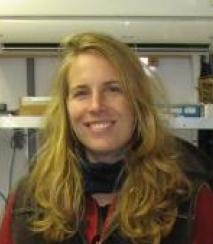
Bio
Postdoctoral Advisor:
Prof. Ronald Prinn
Research Topic:
field-measurements of hydrogen emissions from Arctic wetlands; soil uptake of H2
Watch Part I of a video documentary about Laura and her work studying the microbial H2 sink in Harvard Forest, Petersham, MA.
Laura at Harvard Forest from Ryan Abernathey on Vimeo.
ABOUT THE VIDEO: Two years after embarking on a project to design and build a custom instrument that measures hydrogen fluxes, PAOC graduate student Laura Meredith deploys her creation to the Harvard Forest Long Term Ecological Research site in Petersham, Massachusetts. The instrument shed is tight, but with the help of colleagues at Harvard University, the move is successful. In this short documentary we are introduced to the forest and the project, but the work has only just begun…
ABOUT THE PROJECT: Microorganisms have produced dramatic shifts in the composition of the Earth’s atmosphere. They continue to be important drivers of ocean- and land-atmosphere exchanges of gases that have a strong influence on atmospheric composition and climate. An interesting example is the microbial influence on atmospheric molecular hydrogen (H2), which dominates the fate of this gas in the atmosphere. H2 is emitted to the atmosphere by about half natural and half anthropogenic, or human-induced, processes and it is predominantly removed from the atmosphere by microorganisms in the soil, which makes this process the most important, yet least understood, player in the atmospheric H2 budget. There is a concern that should hydrogen be used as a secondary fuel, increased leakage emissions could increase its atmospheric concentration. How much H2 remains in the atmosphere is likely controlled by the soil sink, which is important because H2 decreases the ability of the atmosphere to ‘cleanse’ itself of greenhouse gases, such as methane, and thus affects the climate. In this project, we deploy a custom-built instrument to the Harvard Forest Long Term Ecological Research site in central Massachusetts to measure the fluxes of hydrogen between the atmosphere and the forest ecosystem, with a targeted eye on its strong soil sink. The instrument measures hydrogen gradients that can, along with a suite of other measurements, be used to calculate hydrogen fluxes. These will be used to determine the strength and seasonality of the soil sink at Harvard Forest.
VIDEO: Ryan Abernathey (creator), Bill Munger, Josh McLaren, Leland Werden, Ben Lee.

